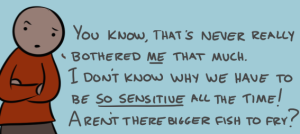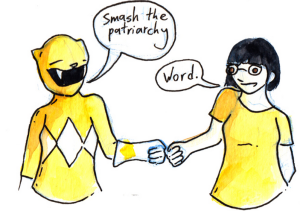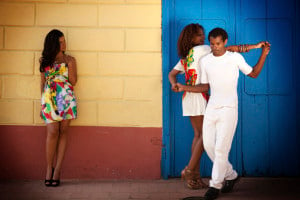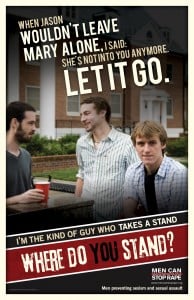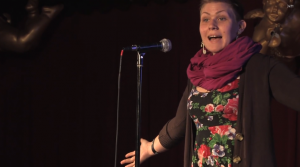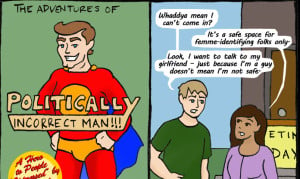
Souce: Cosmopolitan
Originally published on Latina and republished here with their permission.
It’s no surprise that in the U.S. landscape, Latinas are still seen as hot, hypersexual women with copious fertility and uncontrolled reproduction.
But these sexuality and reproduction myths and stereotypes mixed with real cultural pressures to be a mother can be harmful to asexual Latinas — individuals who experience very little sexual attraction to others, sometimes none at all.
Aasha Foster, a doctoral student at Columbia University doing research on the intersection of race and asexuality, said that asexual Latinas are constantly battling these racialized sexist messages, but the severity to which the beliefs affect them varies.
If you are 30, without children and have no prospects of marriage, then people start looking at you funny — some interpersonal ostracizing begins taking place. If a person internalizes those messages, it can lead to higher levels of self-hate and low self-esteem versus someone who can externalize them.”
In Latino culture, Marianismo is an ideal that venerates women for being eternally self-giving.
Traditional ideas of nurturing women who care for others, especially their children, are often still upheld in Latino communities across the U.S.
It’s this mindset that Milo, a 25-year-old asexual-agender Mexican-American, is battling within their* family. Milo recently scheduled a hysterectomy, a decision that has netted a lot of pushback from the people closest to Milo.
“I’ve gotten a number of inappropriate questions and pieces of ‘advice’ over the past few months about it; it seems to me that my ability to bear children … has become a family commodity that I don’t have full and complete ownership of,” said Milo.
Unsolicited advice from family members who “just don’t get asexuality” is a common occurrence, with Latinas recalling numerous times when they were told they “just haven’t found the right guy,” are immature or are in denial.
But ideas about Latina bodies and sexuality also come from outside the family and beyond the Latino community. Greater society, perceiving Latinas as innately hypersexual, remark that asexual Latinas should “stop playing hard to get” and “take the stick out of their butt.”
The underlying message in these comments, according to Foster, are always the same: You cannot possibly be anything other than what I say you are, and because I see you, Latina, as a sexual object, I have access to your body in a way that supersedes your autonomy and your right to your own body.
This dangerous authoritative position is often behind the assault of asexual Latinas who disclose their identity.
When Queenie, 23, came out to her then-boyfriend six years ago, he wanted to prove that he knew her body more than she did by attempting to rape her “straight,” or, in this case, sexual.
Corrective rape — raping to “cure” someone of their sexual orientation — sadly isn’t something Queenie can just leave behind.
The mixed-raced Latina is regularly reminded of the assault, as each time she comes out as asexual (a recurring event for most asexuals) there is the possibility of receiving threatening messages from men who claim they can “fix” her with their “magical penises.”
While it’s true that family misunderstandings and assault can be felt among all asexuals, despite their race or ethnicity, for Latinas, the rationale behind these experiences are often racialized.
As women, Latinas are required to have no sexual desire, but, as racial and ethnic minorities, their bodies are still expected to be sexually available. And when they’re not, Latinas face verbal and physical violence.
But characterizations of Latinas as inherently hypersexual and possessing contemptibly high fertility rates additionally produce another, more insidious form of harm; these myths make it impossible for asexual Latinas to exist in the country’s psyche, obliterating Latinas’ experiences from dominant discourses on asexuality and creating an unnecessary tension for asexual Latinas.
Queenie, for instance, has been accused of abandoning her culture and trying to be white because, as a Latina, an identity embedded with notions of sexuality and motherhood, it’s thought that she can’t possibly be really asexual.
Sadly, the erasure of asexual Latinas extends even within the asexual community. According to Foster, asexual people of color often don’t feel like they belong in asexual groups — both on and offline — as these spaces tend to be overwhelmingly white.
Clarissa, 22, gives an example of how the lack of non-white asexuals in asexual spaces and media make her question if race is something they don’t want discussed. “When I look at work on asexuality, I don’t see people like myself. They’re not interviewed for documentaries,” said Clarissa. “It makes me wonder if race is something they think I shouldn’t talk about, that if I should compartmentalize myself.”
But Queenie, a half-Puerto Rican blogger who does write about her experiences as an asexual Latina, shows that despite speaking to and engaging with her audience on issues of race and asexuality, her racial and ethnic identities are still somehow made invisible.
“People tell me, ‘no person of color has written on this topic,’ and I wonder, ‘how can you say that while looking at me and knowing that I write about this?’ The assumption is that everyone is white, so if you’re a person of color getting attention that part of you is still forgotten and erased,” said Queenie.
Until the myth of the overtly sexual, va-va-voom Latina is put to rest, we as women will continue to be affected. Some in more ways than others.
* Note that “their” is Milo’s gender pronoun.
[do_widget id=”text-101″]
Raquel Reichard is a Latina feminist, freelance journalist and social media strategist. Her writing has been published in the New York Times, Mic and Cosmo for Latinas, and she has written and edited for newspapers in Washington D.C. and Orlando, Fla. As a social media strategist, Raquel has hosted nationally trending tweet chats, spearheaded multiple social media campaigns and trained teams on how to best write engaging social media copy and use social media tools. Check out her website here and follow her on Twitter @RaquelReichard.
Search our 3000+ articles!
Read our articles about:
Our online racial justice training
Used by hundreds of universities, non-profits, and businesses.
Click to learn more
Most Read Articles
- « Previous
- 1
- …
- 30
- 31
- 32





